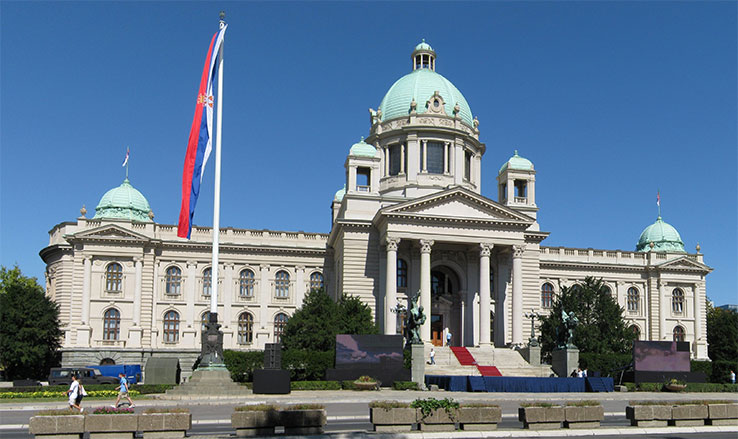Vladimir Djordjević
 It is no wonder that citizens have little trust in the state institutions when they know that informal practices may actually assist them in resolving the issues they face when dealing with formal state institutions and their rules and norms.
It is no wonder that citizens have little trust in the state institutions when they know that informal practices may actually assist them in resolving the issues they face when dealing with formal state institutions and their rules and norms.
In my last blog, I mentioned the fact that, as suggested not only by the recent but also by much older scholarship, private interests represent probably one of the biggest challenges standing in the way of a more meaningful and therefore successful Europeanization of the Western Balkans. These informal networks of influence and power are significant enough to influence the Europeanization of the region in a considerable manner and up to the point of stalling the EU accession of the Western Balkans. When coupled with the lack of new methodology by Brussels on the Western Balkans accession, it appears that the European future of the region remains merely rhetorical and therefore elusive as such.
The private interests in domestic politics are represented by those societal players that either as individuals or through the framework of their respective political parties (and their dominance) enter in usually informal ways into various private ‘deals’, thus instituting a system of informal practices and institutions that becomes synonymous with how political elites run the country.
By informal practices and institutions, I mean not only various forms of informal dealings, in almost all case hidden to the public, that bypass formal state institutions and the rule of law processes but additionally a corresponding system of values that is associated with “informal institutions such as corruption, clientelism, particularism, nepotism and so on”, degrading “formal institutional capacity” of the countries at hand. It is, therefore, no wonder that citizens have little trust in the state institutions when they know that informal practices may actually assist them in resolving the issues they face when dealing with formal state institutions with their rules and norms. Hence, as suggested by the aforementioned research, “informal institutions may prove beneficial in improving the efficiency of formal institutions by facilitating social coordination through personal contacts.”
This then unavoidably impacts how democratic transition of each country facing the same problems plays out, whereby formal practices of the rule of law and its respective institutions are effectively made null and void. As argued by a group of researchers in a 2016 publication edited by Slobodan Cvejić, the informal nature of such a system “represents an important feature of post-socialist societies. Informal and personal networks that predate from the socialist period are an important legacy for development of democratic systems and market economy”, and the Western Balkans is in no way an exception to this rule.
Private vs. Public Interests
The region is in many ways, very much like any other post-communist part of the world in transition, influenced by its socialist past. Coupled with the legacy of the 1990s conflicts and kept alive in the nationalist political discourses that every now and then remind the rest of the world of the Balkans’ violent past, “power maximization” represents the initial step towards creating informal influence and power systems in domestic politics.
 Source: europeanwesternbalkans.com
Source: europeanwesternbalkans.com
It is these systems that political elites start building after assuming control and then start expanding in a gradual manner. The aim of the whole process is centered on the political elites being hell-bent “on extending power and cementing their influence”, constructing a system where the private interests and benefits of those involved supersede and effectively replace the public needs.
Constructing the said system implies the fact that cementing power inevitably leads to the elites accumulating wealth, allowing those in power and those close to them to abundantly benefit by means of thriving on the informal structure and nature of the system created. These systems are then over time expanded to unsurprisingly include those who the political elites can financially benefit from, i.e. major economically influential domestic actors, inevitably leading to “detrimental governance patterns.” These patterns of governance are models that are considerably difficult to change, as the transition of states such as Serbia or Montenegro, among others, clearly shows.
Speaking of Serbia, it is important to mention that the country that is, apart from Montenegro, a frontrunner in the EU accessions process is at the same time largely at odds in fighting conflicts of interest and corruption in high politics, reflected by the fact that “the Serbian police and judiciary did not react to several cases in which ministers have been accused of involvement in corruption and crime.”
The relatively recent case of Nebojša Stefanović, current Defence Minister of Serbia, says it all: at the time when his father was reported by independent media to have been involved in an arms smuggling deal, the Minister’s conflict of interest was vehemently denied by the Serbian state agencies. Additionally, the Kosovan case proves just how difficult it is to reduce the influence of informal practices that have become deeply entrenched in the formal system of institutions, with “political interference and controversial appointments” having become routine in the state’s judiciary system. Relatively recent decision of the Government of Kosovo on “disbanding the Anti-Corruption Task Force” speaks volumes in this respect, indicating that the country is heading into the wrong direction.
There is, of course, plentiful evidence from other states in the region that largely point to the problem at hand. Croatia, having been a member of the Union for a number of years now, is, apart from North Macedonia, one of the few states in the regions where (former) politicians got sentenced for profiteering and corruption. These sentences have, nevertheless, surprisingly remained without any implications for the vast systems of private influence and power that the sentenced politicians had to be part of, if not command while in office. Knowing how these and other Western Balkans’ domestic politics functioned in the 1990s, it is hardly imaginable that the sentenced individuals acted alone.
A research on Croatia published almost a year ago and very much reflective of the situation in the whole region indicates that since the country’s accession into the EU in mid-2013, Zagreb has not actually advanced but rather backslided in respect to the number of illiberal policies and practices, largely centered on “the capture of independent agencies, control of the judiciary, and the weakening of independent media.”
What (Not) to Do
In respect to this, it seems quite peculiar, absolutely trivial, and entirely unprofessional to put individuals (read ‘only some former politicians’) on trial without taking into consideration the context they acted in, the positions they held at that time, as well as the influence they wielded during their time in the office. It is exactly this sort of occasional public shows supposedly tackling corruption that ultimately reveal just how institutionally weak and ineffective the states at hand are, how powerful and influential the informal networks in these states have actually become over time, and ultimately how much weight the private interests of those involved actually have when compared to the public ones.
If the Western Balkan elites are serious in wanting to transform their respective countries successfully, well, then they simply have to quit with the whole charade on the fight against corruption and supposed improvements to the rule of law since the on-going application of the respective legislative framework does not function at all. If it functioned, you would not have but a few (may I add, usually low-rank) individuals/politicians sitting behind bars but also those who comprise current political and economic elite that need to be held accountable as well.
This state of play indicates that the political will to solve the problem at hand does not exist or remains scarce as such, reminding all of us yet again that the Western Balkans is heading in the direction of the “total control of state institutions, coming to serve the elites rather than enforcing the standards of institutional behavior.”
Last but not least, the societies in question need to strive towards changing social values that have allowed for the informal practices and institutions to be as powerful as they have become. This does not only depend on the quality of education or the political elites that should do lion’s share of ‘work’ in this regard but also cultural and social elites that likewise have great responsibility in making sure that the transition and transformation of the said societies are followed by a social value change.
Please refer to the Terms before commenting and republishing the content.
Note: The views and opinions expressed in this article are those of the author and do not necessarily reflect the views of the Institute of Communication Studies or the donor.


